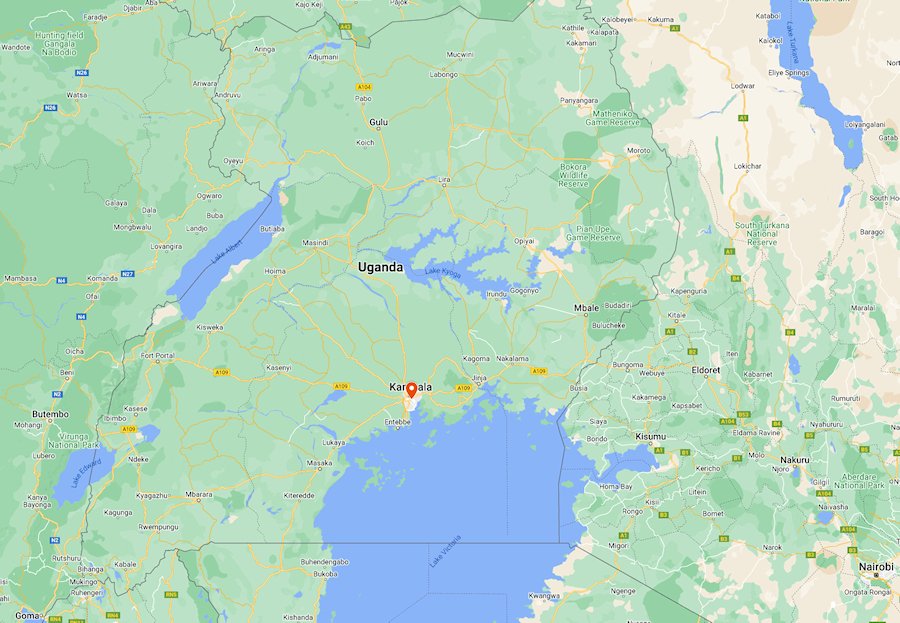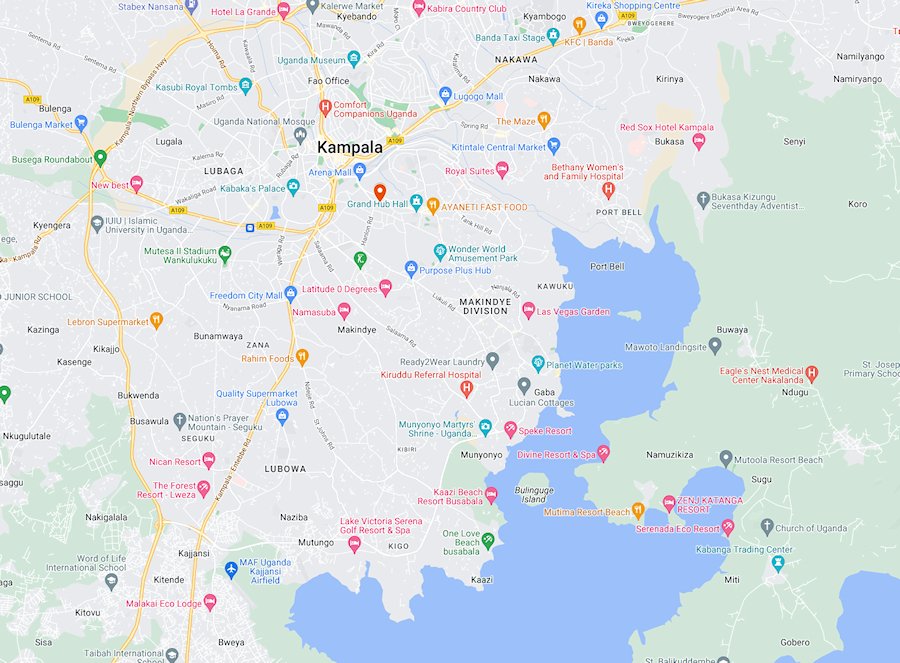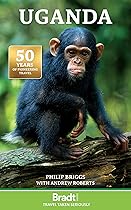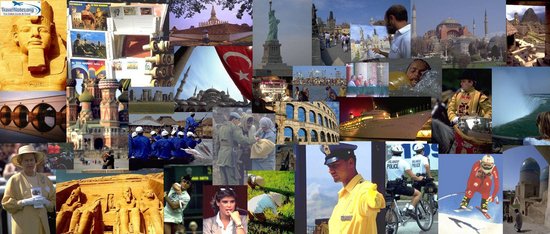Travel Notes: Africa - Uganda Travel Notes.
Short URL: https://tnot.es/UG
Uganda Travel and Tourism on Travel Notes
Discover The Beauty of Uganda - Gorillas, Wildlife and Adventure
Explore Uganda's breathtaking landscapes, encounter majestic mountain gorillas, witness diverse wildlife, and embark on memorable East Africa adventures. Share on Facebook
About Uganda
Uganda is famous for its gorilla trekking, wildlife safaris, cultural tourism, and scenic diversity.
Countries neighbouring Uganda: Democratic Republic of the Congo, South Sudan, Kenya, Tanzania and Rwanda.
 Add a Business -
Add a Location -
Add a Lodging - Add Travel Content
- Add URL
- Travel Services.
Add a Business -
Add a Location -
Add a Lodging - Add Travel Content
- Add URL
- Travel Services.
Mapping Uganda
Map of Uganda
Uganda was made up of four kingdoms and many tribes before it was ceded to Britain, in 1890.
The capital of Uganda is Kampala, the largest city in the country.
Uganda Overview
Uganda is a landlocked country located in East Africa, bordered by South Sudan to the north, Kenya to the east, Tanzania and Rwanda to the south, and the Democratic Republic of the Congo to the west.
Uganda is a country with a rich cultural heritage, stunning natural beauty, and a promising future despite its challenges.
Challenges
Like many developing countries, Uganda faces various challenges, including poverty, corruption, healthcare issues, and infrastructure deficiencies.
However, the government and various international organisations are working to address these issues and improve the overall well-being of the population.
Culture
Uganda has a rich cultural heritage with diverse ethnic groups, each with its own traditions, music, dance, and art.
The Baganda ethnic group is the largest in Uganda and has a significant influence on the country's culture.
Economy
Agriculture is the backbone of Uganda's economy, employing a significant portion of the population.
Major exports include coffee, tea, cotton, and fish.
Tourism also plays a significant role in the economy, thanks to the country's natural beauty and wildlife.
Geography
Uganda is known for its diverse landscapes, including savannahs, tropical forests, mountains, and lakes.
The country is home to Lake Victoria, the largest lake in Africa and the second-largest freshwater lake in the world.
History
Uganda has a complex history, including pre-colonial kingdoms, British colonial rule, and periods of political instability and conflict; including the rule of Idi Amin in the 1970s and the civil war under the leadership of Joseph Kony, and the Lord's Resistance Army in the late 20th and early 21st centuries.
Languages
English is the official language of Uganda, inherited from its colonial past under British rule.
However, there are over forty indigenous languages spoken throughout the country, with Luganda being the most widely spoken local language.
Politics
Uganda is a presidential republic, with the President serving as both the head of state and government.
The country has had a history of political instability, but it has seen relative stability in recent years under the leadership of President Yoweri Museveni.
Population
Uganda is one of the most populous countries in East Africa.
Wildlife
Uganda is renowned for its diverse wildlife and is home to many national parks and reserves, including Queen Elizabeth National Park, Murchison Falls National Park, and Bwindi Impenetrable National Park; which is famous for its population of mountain gorillas.
Visiting Uganda
There are many reputable and professional guides and tour operators available to help tourists experience the wonders of Uganda in comfort.
Uganda Highlights
Remember to check travel advisories and guidelines before planning your visit to Uganda, and consider hiring a reputable tour operator or guide to ensure a safe and memorable experience.
Adventure Activities
For adrenaline junkies, Uganda offers plenty of adventure activities such as white-water rafting on the Nile River, bungee jumping over the Nile, zip-lining in Mabira Forest, and quad biking around Lake Bunyonyi.
Bird Watching
Uganda is a paradise for bird watchers, with over 1,000 bird species recorded in the country.
Visit birding hotspots like Lake Mburo National Park, Kibale Forest, and Semuliki National Park for an unforgettable birding experience.
Boat Safaris
Take a boat safari along the Nile River in Murchison Falls National Park or the Kazinga Channel in Queen Elizabeth National Park.
It's an excellent way to see wildlife up close, including crocodiles, hippos, and various bird species.
Cultural Experiences
Immerse yourself in Uganda's vibrant culture by visiting local communities, participating in cultural activities, and learning about traditional customs.
Don't miss the opportunity to visit the Kasubi Tombs in Kampala, a UNESCO World Heritage Site and burial grounds for Buganda kings.
Gorilla Trekking
One of the most popular attractions in Uganda is gorilla trekking in Bwindi Impenetrable National Park or Mgahinga Gorilla National Park.
It's a once-in-a-lifetime experience to see these magnificent creatures in their natural habitat.
Local Cuisine
Sample Uganda's delicious cuisine, which includes staples like matoke (steamed green bananas), luwombo (a traditional stew), rolex (a popular street food), and fresh tilapia from Lake Victoria.
Relaxation
After all the adventure and exploration, unwind and relax on the beautiful beaches of Lake Victoria or enjoy a tranquil boat ride on Lake Bunyonyi, known as the 'Switzerland of Africa'; located in south-western Uganda, between the towns of Kabale and Kisoro.
Safari Adventures
Uganda offers fantastic opportunities for safari adventures.
Explore the diverse wildlife in national parks like Queen Elizabeth, Murchison Falls, and Kidepo Valley.
You can spot lions, elephants, giraffes, hippos, and a wide variety of bird species.
Scenic Beauty
Explore Uganda's stunning landscapes, including the picturesque Ssese Islands on Lake Victoria, the Rwenzori Mountains, the crater lakes region in Fort Portal, and the stunning scenery along the Nile River.
Warm Hospitality
Experience the warmth and hospitality of the Ugandan people, known for their friendliness and welcoming nature.
Uganda Background
Bunyoro was the first of the great Ugandan kingdoms around the 15th century.
During disharmony in the late 18th century, the governor of Buganda declared his independence from Bunyoro, and the new kingdom soon became the major lake state.
Two smaller kingdoms, Ankole and Toro, also seceded from Bunyoro.
Buganda
Located in the south-central region of the country known today as Uganda, Mmengo (Kampala) was the seat of government of The Kingdom of Buganda.
On December 19, 1997 the government of Uganda handed back the Mmengo Palace (Lubiri), main palace of Buganda's kings since the time of Mwanga II.
The first Europeans to visit Uganda were British explorers searching for the source of the River Nile.
Protestant and Roman Catholic missionaries soon followed, and the factions they created caused a civil war in Buganda.
The British ended the disturbances, and used Bugandan forces to help conquer the other kingdoms and tribes.
The name Uganda was adopted in 1896. The British protectorate gained independence on October 6, 1962.
Sir Winston Churchill called Uganda, The Pearl of Africa.
Source of The Nile
Uganda is a landlocked republic in eastern Africa, although almost 20 per cent of its area is water.
Journal of The Nile Discovery by John Hanning Speke: (1827-1864)
In December 1856 John Hanning Speke accepted an invitation from Richard Burton to join an expedition to search for the reported great lakes in east central Africa and, particularly, to try and find Lake Nyassa, said to be the origin of the Nile.
Kampala
Map of Kampala
The capital of Uganda is in the south of the country, near Lake Victoria.
Old Kampala Hill was where the British first established a fort in 1890. The tombs of the kings, or kabakas, of Buganda are on Kasaubi Hill.
Kampala was capital of the British protectorate, from 1900 to 1905, and succeeded nearby Entebbe as capital; when the country became independent, in 1962.
Mengo, to the south-west, was the traditional capital of the kingdom of Buganda.
Kampala, Uganda
Kampala Travel Guide - Journey to Uganda's Vibrant Capital City:
Kampala serves as a great base for trips to nearby attractions like Lake
Victoria and the Bwindi Impenetrable National Park, home to mountain
gorillas.
Where to Stay in Kampala
Kampala Serena Hotel
Kampala Serena Hotel: Kintu Road, Kampala, Uganda.
Serena's Uganda flagship, hotel is an inspirational blend of five5-star polish, pan-African panache, social style and business reliability.
Guests at the Kampala Serena Hotel loved the comfortable rooms, the stunning pool, and the internationally themed and locally inspired cuisine.
Uganda Accommodation
There are international standard hotels in Uganda, especially in the main towns of Entebbe, Jinja and Kampala.
The quality is variable in the smaller towns and rated accommodation is scarce.
All of the major national parks offer accommodation in game lodges and tented camps.
During the high tourist season (July-August) it is advisable to book in advance as the best hotels in Uganda usually fill up fast.
Around Uganda
Driving in Uganda
If you want to drive around Uganda, you need to show an international drivers license to hire a vehicle.
Rental Cars in Uganda are available in Entebbe and Kampala. Roads radiate from Kampala and are of varying quality.
In the north of the country the security situation is still doubtful and so are the roads. Its is a good idea, if you are on self-drive, to get local advice about the condition of the roads you intend to use.
Natural Uganda
Within Uganda are Lakes George and Kyoga; and parts of Lakes Victoria, Edward, and Albert form its borders with neighbouring Kenya, Tanzania, and Zaire.
These lakes and most of Uganda's rivers form parts of the basin of the upper River Nile; feeding the White Nile that flows through Sudan.
Uganda's highest peak is Mount Margherita (5,119 m); in the snowy Ruwenzori range, on the south-west border with Zaire.
The Uganda Wildlife Authority is Uganda's Government agency responsible for the management and protection of Wildlife, with ten national parks and twelve wildlife reserves under its jurisdiction.
Visiting Uganda
The best times to visit Uganda are December-March and June-September; avoiding the two rainy seasons: April to May and October to November, with April being the wettest month.
Safaris in Uganda:
Although applying for a Bwindi Forest gorilla permit may be a pain, safari travellers in
Uganda are generally a rare breed.
Entebbe
Entebbe, on the north-west shore of Lake Victoria, is primarily a residential centre for government staff in the nearby capital.
It was the British colonial administrative centre of Uganda from 1893 to 1958. The city has fine botanical gardens.
Entebbe Airport - the scene of an Israeli commando raid that freed more than 100 hostages, from an airliner hijacked by pro-Palestinian guerrillas, in 1976 - is one of the largest in East Africa.
The national carrier is Uganda Airlines.
Uganda Tourism
Tourism is on the increase in Uganda, due in part to the privatisation initiatives implemented by the government and the increased security situation; especially in the national parks.
Explore Uganda
Explore the undeniable natural beauty of the Pearl.
Uganda Tourism Board:
Lugogo House,
Plot 42 Lugogo Bypass
P.O. Box 7211 Kampala, Uganda.
In the west, the Rwenzori peaks reach towards the sky - a perfect challenge for bold explorers - and all across the nation, parks are home to some of the world's most exotic animals and Africa’s big five.
Winding roads lead to places of grand beauty and unique cultures for those who dare to explore.
There's a story at every turn, especially from the Ugandan people, who are renowned for their warmth and charm.
The Association of Uganda Tour Operators is Uganda's leading tourism trade association, representing the interests of the country’s leading and experienced professional tour operators.
Uganda News
Read the latest news from Uganda at The Monitor.
Uganda Maps and Travel Guides
Uganda Travel Guides - Uganda Maps.
Weather in Africa:
Local weather forecasts for destinations around Africa.
|
|
More From Travel Notes
Travel Notes Online Guide to Travel
Africa - Asia - Caribbean - Europe - Middle East - North America - Oceania - South America.
The Travel Notes Online Guide to Travel helps visitors plan their trip with country and city travel guides, local tourist information, reviewed web sites, and inspiring travel content.
Travel and Tourism Guides on Travel Notes
 If you find Travel Notes useful, please take a moment to
like us on Facebook and share with your friends on social media.
If you find Travel Notes useful, please take a moment to
like us on Facebook and share with your friends on social media.
Share on Facebook
Travel Resources
.
Travel & Tourism With Industry Professionals.
















